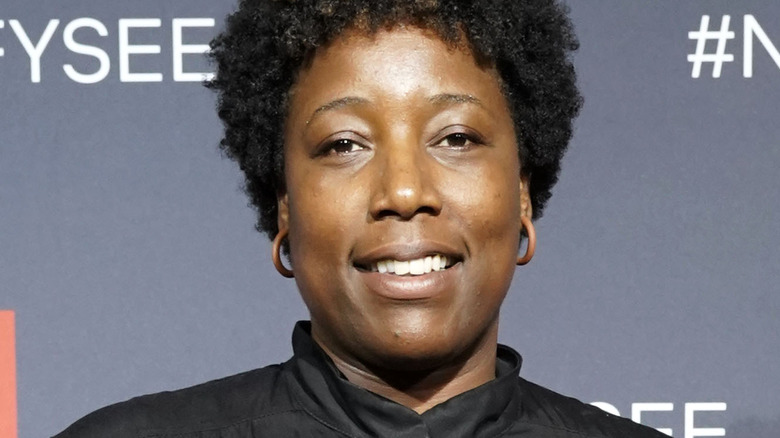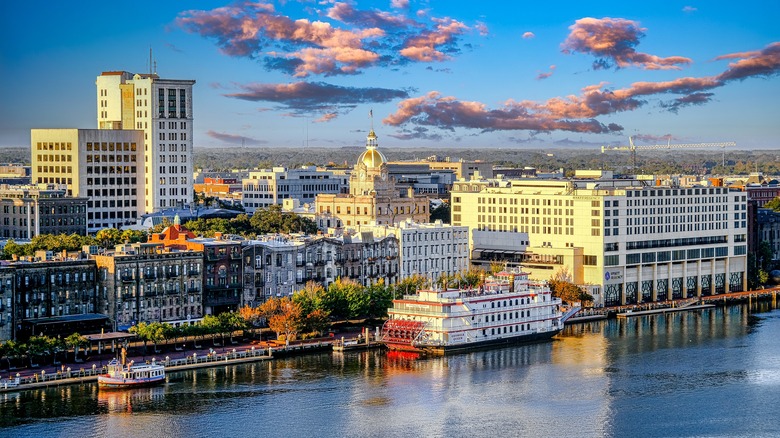The Importance Of Diversity In Restaurants To Mashama Bailey
Despite being born in the Bronx and raised in Queens (via The Grey Restaurant), Mashama Bailey remembers her childhood in Georgia. There she attended grammar school and spent summers at her grandmother's home, learning the art of Southern cooking. But, when she turned 10 and moved back to the basement of her father's family home in Queens (via Financial Times), her childhood was cut short. While her parents worked multiple jobs, attended school, and got their social work degrees, Mashama faced new responsibilities. That's when food became her comfort.
So, after deciding not to follow in her social worker parents' footsteps, Mashama went to culinary school at the Institute of Culinary Education in New York. From there, she worked in her first professional kitchen. Eventually, she found her way to a Manhattan restaurant called Prune, where she met Johno Morisano — a media startup guy turned restauranteur — who, when they met in 2014, was looking for a chef and partner to join him in converting a rundown Savannah bus station into a local food spot. As soon as she walked into the space, Mashama knew it was what she was meant to do.
Years later, her role at the restaurant, The Grey, has earned Mashama many accolades — including the James Beard Award for Outstanding Chef in 2022, according to Savannah Now. But today, her primary focus is becoming a chef who impacts Savannah's restaurant culture.
The Grey
"I'm working very hard at not being a flash in the pan," Mashama tells Eater. "I want to be a part of this community. I'm invested; I'm proud of my restaurant community." For Mashama, this means more than serving high-quality meals that exemplify the influence that the black community has had on the culinary history of the South — which she undoubtedly does, and very well. But, given that the restaurant operates out of a remodeled, Jim Crow-era bus station, the James Beard winner feels compelled to continue pushing boundaries.
Built in 1938, per Financial Times (FT), the bus station that is now The Grey was once segregated under the state of Georgia's Jim Crow laws. Originally, Mashama took up Johno's offer to visit the space simply because she was interested in seeing a piece of history. But, when she stepped into what was once the colored waiting room, she told FT, "I thought, I belong here, and I'm supposed to do this." Being in a space with such significant history, Mashama and Johno have had to be intentional in their hiring practices.
Desegregating the restaurant
While things have come a long way for the black community in the South, since living and working there, Mashama has noticed a contrast between the Savannah food scene and New York's. When hiring for back-of-house positions, such as cooks and porters, Mashama told Eater that the majority of applications they receive are from African-Americans. On the other hand, when they're hiring for positions in the front of the restaurant, most applicants are white. The issue has posed a challenge for Mashama, who strives to create a restaurant environment representative of herself, her family, and the community she grew up in.
"If a black person comes in and sits down and eats dinner, they're looking around to see who's serving them. It's important to represent everyone," Mashama tells Eater. Her way of combatting this is informing the community on just how viable a career in the service industry can be — one that not only builds applicable skills but makes money that people can raise their families on. While Mashama and Johno continue to prioritize hiring the most qualified people for the job, they both have the same goal of maintaining diversity — both in the front of the restaurant and the back — that is representative of the community they serve.


